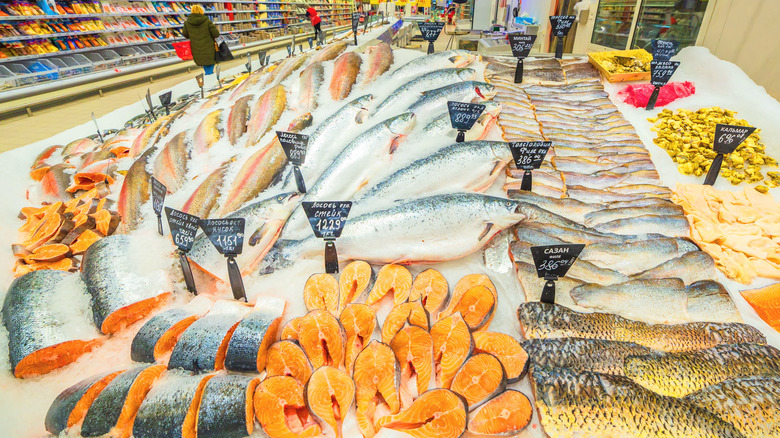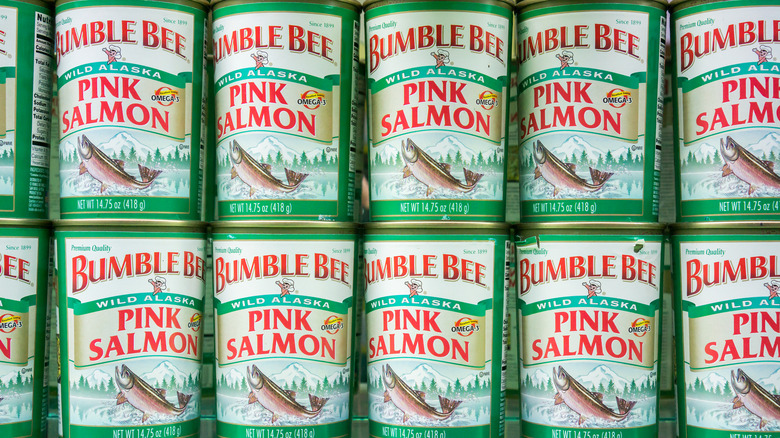How Russian Fish Are Getting Around The US Import Ban
As Russia's unprovoked war in Ukraine continues, Americans may unwittingly be purchasing banned exports from Kremlin-backed industries due to a previously overlooked loophole in U.S. import laws. This work-around, known as the "substantial transformation" policy, according to Insider, has had a particular impact on the seafood market, essentially duping consumers into supporting a Russian economy, which Brookings reports 89% of Americans want to see continue to be harshly sanctioned.
Last month the U.S. and its allies in the EU and G7 revoked Russia's Most Favored Nation status for trade, allowing them to raise tariffs on Russian products and banning the importation of certain products (via Bloomberg). The U.S. then announced a ban on imports of Russian oil and gas as well as signature Russian goods including diamonds, alcohol, and seafood — a move which finally answered Russia's costly 2014 ban on Alaskan seafood imports imposed as retaliation for U.S. sanctions against Russia for its annexation of Crimea from Ukraine. While many people saw this as a ban on products like caviar and vodka, two of Russia's most iconic culinary contributions, the seafood ban in particular is much more far-reaching.
According to the Associated Press, Russia is one of the world's top seafood producers and in 2021 imported $1.2 billion worth of fish to the United States mostly crab, salmon, and pollock. Unfortunately, due to the "substantial transformation" policy, not all that fish is clearly marked as Russian-caught, which means it can still technically be sold in the U.S.
A fishy loophole
The issue with the "substantial transformation" loophole, as pointed out by Insider, is that once a product is processed in another country it can be marked as originating in the processing country. For instance, frozen fish sticks. Fish caught in Russia can't be imported into the U.S. under the current sanctions, however, if Russian fisheries send their pollock to a facility in China which processes it into fish sticks and packages them for sale in your local freezer section, it is marked as an import of China, even though, as the AP reports, pollock is not native to China and cannot originate there.
This is exactly what Russia is doing. According to the AP report, approximately one-third of the fish imported from China to the U.S. is actually caught in Russia, but American consumers and restaurateurs opposed to a war, which could cripple global food supplies, have no way of knowing it, because country of origin labeling is not required on imports.
Insider reports that this issue has also arisen with diamonds, though large players in the jewelry market have been more proactive in staving off the problem. While about 30% of the world's diamonds come from Russia, they are nearly all cut in facilities in India, and are thus marketed as products of India. However, buyers such as Tiffany's and Signet — the owners of Zales and Kay jewelers — have begun sourcing diamonds purchased from processors around the world, effectively cutting off the Russian market.
Closing the gap
Some Americans are now pushing for the government to close the "significant transformation" loophole and require deeper looks at supply chains. The House of Representatives held a hearing on April 7 where experts testified that sanctions would be ineffective if transparency was not improved (per NRDC).
At the hearing Sally Yozel, senior fellow and Stimson Center's director of environmental security, stated "despite the good intentions to strike an economic blow to Russia after its unprovoked invasion of Ukraine, this ban will not work without full seafood traceability, and real information on the origin of the catch."
In addition to cutting off funding for Russia's war on Ukraine, which has led to the deaths of over 1,000 Ukrainian civilians and displaced millions more, experts and politicians have argued that the seafood supply chain should be more closely monitored to avoid unethical and unsustainable fishing practices. The AP also reported that Russia was ranked number two in the world for illegal, unregulated, and unreported fishing, with only China demonstrating a worse record.
It is unclear if the Biden administration will act to close this loophole, however, one former U.S. Customs Service attorney, Peter Quinter, told the AP it would be fairly simple to do by implementing the same strategy recently employed to stop the importation of goods made by forced labor of China's Uyghur Muslims.


